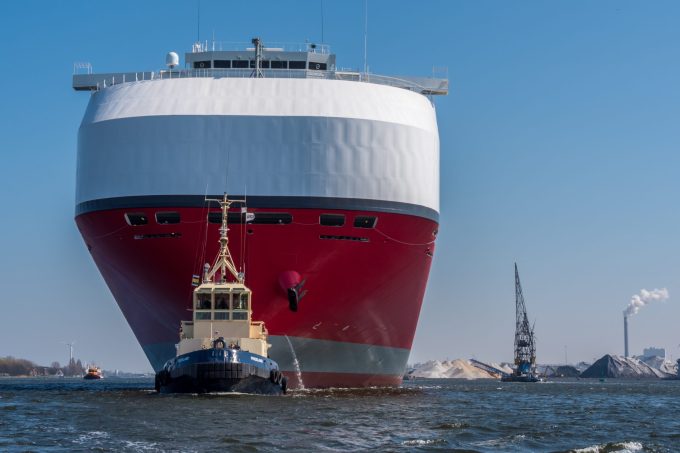Top 10 carriers divide over new fuels, orderbooks show
All the top-10 largest box lines appear to be moving away from conventional fuels in ...
BA: WIND OF CHANGEMAERSK: BULLISH CALLXPO: HEDGE FUNDS ENGINEF: CHOPPING BOARDWTC: NEW RECORDZIM: BALANCE SHEET IN CHECKZIM: SURGING TGT: INVENTORY WATCHTGT: BIG EARNINGS MISSWMT: GENERAL MERCHANDISEWMT: AUTOMATIONWMT: MARGINS AND INVENTORYWMT: ECOMM LOSSESWMT: ECOMM BOOMWMT: RESILIENCEWMT: INVENTORY WATCH
BA: WIND OF CHANGEMAERSK: BULLISH CALLXPO: HEDGE FUNDS ENGINEF: CHOPPING BOARDWTC: NEW RECORDZIM: BALANCE SHEET IN CHECKZIM: SURGING TGT: INVENTORY WATCHTGT: BIG EARNINGS MISSWMT: GENERAL MERCHANDISEWMT: AUTOMATIONWMT: MARGINS AND INVENTORYWMT: ECOMM LOSSESWMT: ECOMM BOOMWMT: RESILIENCEWMT: INVENTORY WATCH

Shipper clients of pure car and truck carriers (PCTCs) are “hiding” their decarbonisation success from the public, shortsea operator UECC has suggested.
The PCTC operator, which conducts shortsea ro-ro operations throughout Europe, has established a biofuel framework based on ‘mass balancing’, similar to how Maersk uses methanol.
Daniel Gent, UECC’s energy & sustainability manager, explained that a large amount of research had gone into the sourcing of biofuel: the due diligence on biofuel provenance and origins – something for which not every company has the resources.
Asked whether the same level of research could be expected from customers of shipping rather than operators, Mr Gent said: “If I were the end user, buying a car, and paying the premium of €100 because Mercedes told me they transported it carbon neutrally – I would reasonably expect them to do the logistics carbon-neutrally.”
But Mr Gent admitted that UECC had helped customers “hide” their efforts to purchase biofuel for insetting. The reason, he explained, was that carmakers want to decarbonise transport, but lack the resources for the due diligence, preferring to outsource this responsibility to UECC. In such cases, shippers do not wish to expose themselves to the risk of being caught out.
“We’ve had some very interesting discussions with our customers, where they have said, ‘well, if we can, in a way, hide it in a bunker adjustment factor, then we can do it’.
“I’ve said, ‘why do you want to hide it? Why don’t you want to tell the world what you’re doing?’ But my impression is that they are often scared… that people will question them, and they haven’t got that biofuel provenance information because they haven’t done that due diligence.”
UECC is experimenting with a fuel based on cashew nut shell liquid (CNSL), undergoing sea trials with a blend of 30% CNSL.
“It is not generally used in our industry; it has a pretty bad name, because CNSL is used in epoxy coatings – not something you would want in the cylinders of your engine,” he said. “We made up some blends with our supplier, ACT, and started testing.”
UECC will continue testing for 2500 hours. Mr Gent said: “100% CNSL is a challenge… next up we’re going to be using B100, which is a blend of CNSL and other biofuel types.”
He believes the biofuel industry is beset by misleading claims, saying it “…needs to be cleaned up massively”.
Biofuel, referred to as sustainable aviation fuel (SAF) when used in airliners, has been plagued with setbacks over unsustainable feedstocks. Throughout Malaysia, palm plants grown on deforested cropland are used to make virgin palm oil, which is exported to China, blended with other fuels and rebranded as biofuel or SAF. And evidence suggests similar biofuel-laundering happens throughout Europe.
The combined effect of deforestation, transportation and tank-to-wake carbon emitted means this type of fuel could have a carbon footprint substantially worse than fossil fuel, defeating the purpose of using it.
“You can have a biofuel that comes out of China, and its sustainability credentials could be extremely questionable,” Mr Gent said. “But that fuel can be shipped to another country, and then be re-exported as something like marine biofuel or marine biodiesel. So I think what’s really important is that the shipping company does that due diligence.”
Listen to the latest News in Brief Podcast for a quick recap of last week’s supply chain news and insight into what you might see this week:
Comment on this article